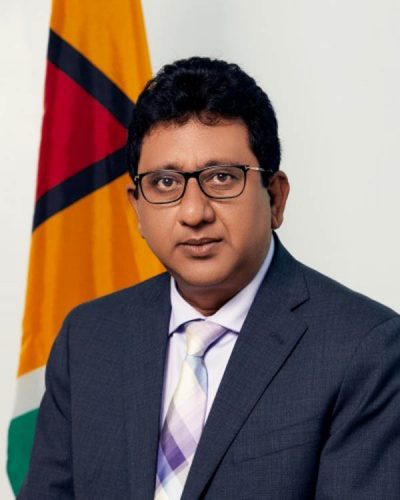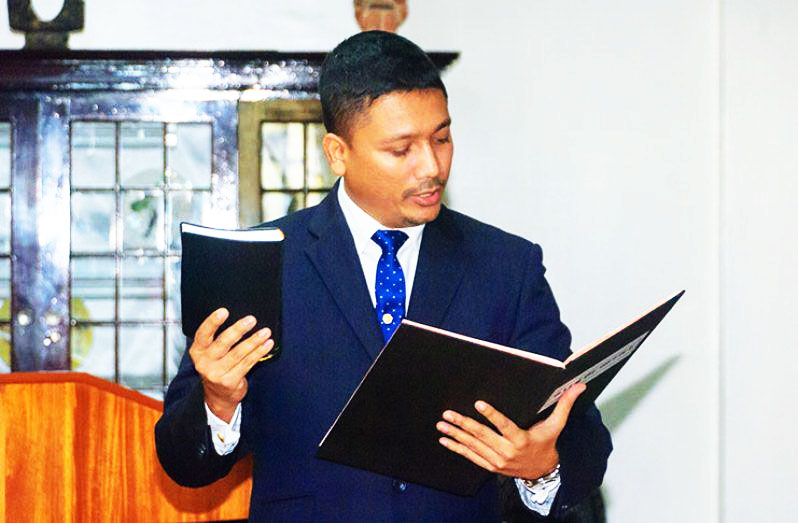-deplores `veiled threat to independence of judiciary’
`The AG is not the legal guardian of the minds of the Guyanese people.
It is an opportunistic political argument perhaps best suited to the hustings of an elections campaign than a sound legal argument suitable for Court. It is most unfortunate, disrespectful and should have been withdrawn’
Finding in favour of two companies seeking to enforce an arbitral ruling against Venezuelan oil company, PDVSA, Justice Gino Persaud on Friday rapped Attorney General (AG) Anil Nandlall SC for suggesting that such a decision could be seen as “unpatriotic” and “anti-nationalist”.
In his ruling seen by the Sunday Stabroek, Justice Persaud also remonstrated with the AG for what was seen as a “veiled threat to the independence of the judiciary designed to intimidate the court”.
The judge’s ruling has its genesis in an application by Phillips Petroleum Company Venezuela Limited and ConocoPhillips Petrozuata BV for the enforcement here of a 2019 arbitral ruling against PDVSA, Corpoguanipa and PDVSA Petroleo. Similar applications have been made in other Caribbean jurisdictions and granted. PDVSA has had years of commercial transactions with the Guyana Government and payments remain outstanding to it.
 In his ruling, Justice Persaud said that he is satisfied on a balance of probabilities that the applicants are entitled at common law to have the arbitral award recognized and judgment entered in its favour in terms of the Award and to have it enforced in Guyana.
In his ruling, Justice Persaud said that he is satisfied on a balance of probabilities that the applicants are entitled at common law to have the arbitral award recognized and judgment entered in its favour in terms of the Award and to have it enforced in Guyana.
He averred that the right to enforce an arbitral award at common law is well established and arises from the implied promise to pay the award that emanates from the arbitration agreement.
He pointed out that a foreign arbitral award will be enforced at common law if the award is (a) in accordance with an agreement to arbitrate which is valid by its applicable law, and (b) valid and final according to the law governing the arbitration proceedings.

Noting that the general approach of the courts to such awards is pro-enforcement, the judge said that the applicants had successfully registered and enforced the same award in the UK, USA, Hong Kong, Jamaica, Trinidad, the Netherlands and Portugal and “no lawful reason was established before me as to why it should not be registered and enforced in Guyana”. The judge pointed out that the respondents did not appear to contest it.
In Jamaica, he said that the Jamaican Supreme Court appointed a Receiver in 2021 to collect funds owed by the Government of Jamaica to PDVSA in relation to the PetroCaribe arrangement between Venezuela and Jamaica and so far, approximately US$23M has been collected and used towards satisfaction of the arbitral award.
He then addressed the objections of the Attorney General.
“I do not agree with the public policy argument as articulated and advanced by the Attorney General and this argument cannot be relied upon to defeat the Applicant’s enforcement application. I do not accept that recognition and enforcement of the Award would be contrary to public policy within the parameters argued by the Attorney General. This argument is misconceived.
“The Respondents submitted to, participated in and were represented throughout the arbitration and the arbitral award was delivered to the parties on 2nd August, 2019. The Respondents were ordered to be served by me of these Enforcement Proceedings and having been satisfied that they were properly served the Respondents opted not to contest these proceedings.
“The notions submitted by the AG in writing at paragraphs 69 and 71 of his submissions that if I were to recognise the Award it would be wholly offensive and expose the Court in the minds of the Guyanese people to allegations of unpatriotic and anti-nationalist conduct is an offensive submission if not a veiled threat to the independence of the judiciary designed to intimidate the Court. The AG is not the legal guardian of the minds of the Guyanese people. It is an opportunistic political argument perhaps best suited to the hustings of an elections campaign than a sound legal argument suitable for Court. It is most unfortunate, disrespectful and should have been withdrawn. No practitioner (whether a novitiate recently admitted to the Bar or the Leader of the Bar) should ever accuse a sitting judge of unpatriotic and anti-nationalist conduct moreover to reduce it into writing”, the judge declared.
Justice Persaud said that Guyana is now a premier destination for investment as the world’s fastest growing economy.
“It would not augur well for our image and reputation in the eyes of international corporate titans who may be willing to do business here that international arbitral awards are problematic to recognise, register and enforce in Guyana or it is not worth the effort or that the burdens outweigh the benefits. To counter such negative perceptions, it is imperative more than ever that a strong and independent Judiciary be capable of fairly and impartially pronouncing on such enforcement applications with predictability which the commercial world takes comfort in. The Judiciary cannot be timorous in the face of impassioned opposition by the State to deny recognition and enforcement because to do so would be `offensive, unpatriotic and anti-nationalist’’”, Justice Persaud asserted.
He therefore ruled that the applicants are entitled at common law to have the arbitration award dated 29 July 2019 made by the Arbitral Tribunal in the matter of ICC case No. 22527/ASM/JPA between the Applicant Company and the Respondents Companies recognized in the Supreme Court of Guyana.
Interest was also awarded at the same rate as awarded by the Arbitral Tribunal.
The Respondents now have 42 days from the date of the service of the Order of Court upon them to apply to set it aside if they wish
The applicants will be permitted to enforce the Award and judgment against the Respondents, jointly and severally after the expiration of at least 42 days following service of the Order of Court on the Respondents unless they apply within that time to set it aside.
No order was made as to costs.
The 2024 budget showed that Guyana owes PDVSA around US$84m for oil supplied on concessional terms during the Chavez/Maduro governments. Repayment of this sum could now be subject to the arbitral ruling.
On May 30th this year, Reuters reported that a Trinidad and Tobago court order had granted ConocoPhillips the right to enforce a US$1.33 billion claim against Venezuela for past expropriations.
The decision gave U.S. oil company Conoco the right to seize any compensation to Venezuela from joint gas projects with Trinidad. The countries and energy companies NGC, Shell SHEL.L and BP BP.L are looking to develop major offshore gas fields.
Since winning arbitration awards against Venezuela and its state oil company PDVSA, Reuters said that Conoco has sought to enforce the ruling in different courts, including in the U.S. and the Caribbean.
“The order gives to the claimant a green light to be able to enforce the judgment in Trinidad if they can establish there are assets held by the defendants or there is money which is owed to the defendant by entities in Trinidad and Tobago,” High Court Judge Frank Seepersad told Reuters in a phone interview.
PDVSA has paid Conoco about US$700 million through a settlement agreement, but ceased payments in late 2019. Conoco is the largest claimant in a Delaware case that will auction shares in the parent of Venezuela-owned refiner Citgo Petroleum to pay creditors seeking more than US$20 billion in compensations.
Conoco, whose arbitration case against PDVSA before the International Chamber of Commerce gave the company the right to recoup up to US$1.89 billion plus interest for the expropriation of its oil assets in Venezuela, said in its request to Trinidad’s High Court that it would try to attach any reimbursement paid to PDVSA.
“By this application, the claimants seek…recognition of the award; judgment in the terms of the award set forth in the draft order accompanying the application; and permission to enforce the award,” the document said.




